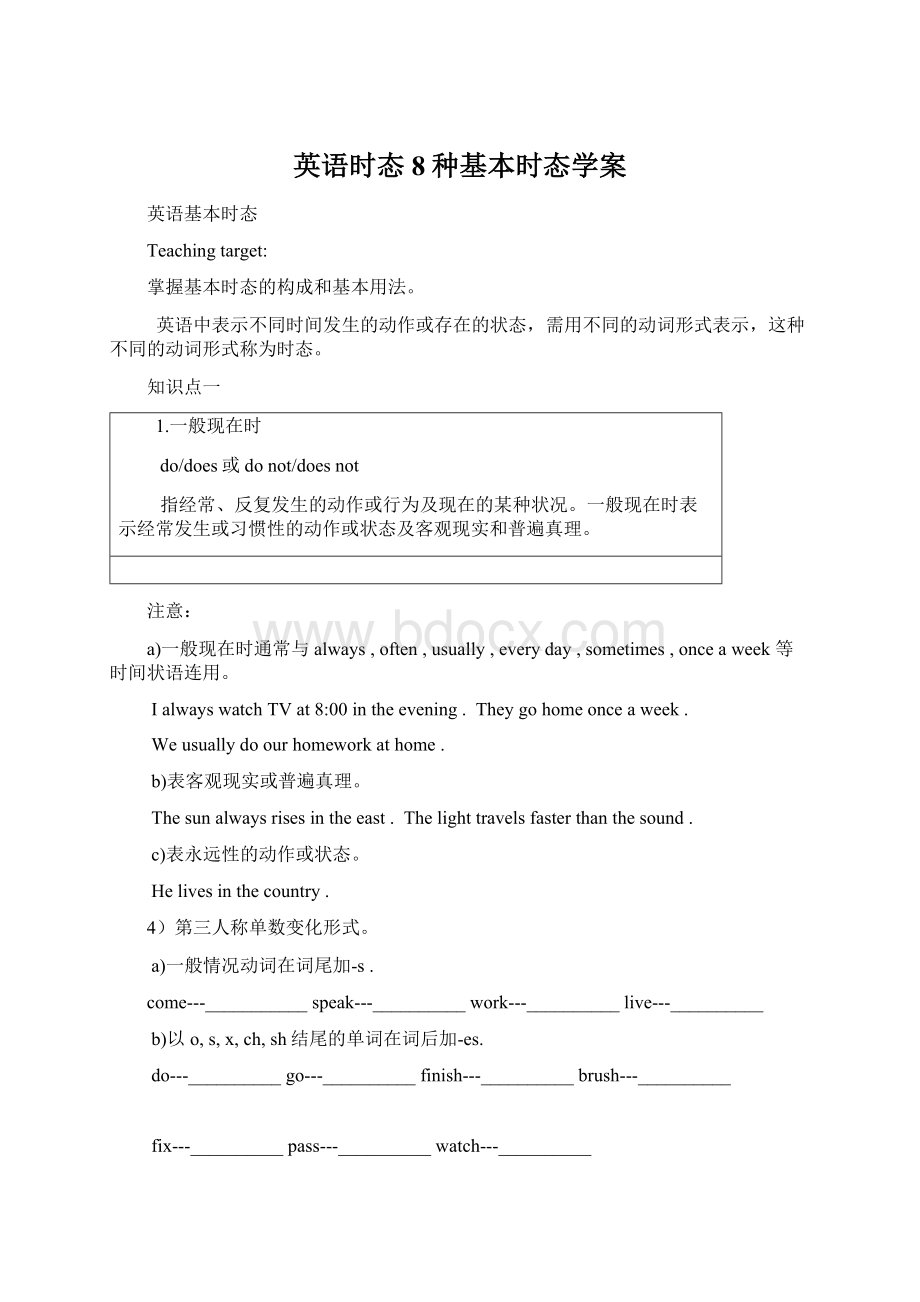英语时态8种基本时态学案.docx
《英语时态8种基本时态学案.docx》由会员分享,可在线阅读,更多相关《英语时态8种基本时态学案.docx(12页珍藏版)》请在冰豆网上搜索。

英语时态8种基本时态学案
英语基本时态
Teachingtarget:
掌握基本时态的构成和基本用法。
英语中表示不同时间发生的动作或存在的状态,需用不同的动词形式表示,这种不同的动词形式称为时态。
知识点一
1.一般现在时
do/does或donot/doesnot
指经常、反复发生的动作或行为及现在的某种状况。
一般现在时表示经常发生或习惯性的动作或状态及客观现实和普遍真理。
注意:
a)一般现在时通常与always,often,usually,everyday,sometimes,onceaweek等时间状语连用。
IalwayswatchTVat8:
00intheevening.Theygohomeonceaweek.
Weusuallydoourhomeworkathome.
b)表客观现实或普遍真理。
Thesunalwaysrisesintheeast.Thelighttravelsfasterthanthesound.
c)表永远性的动作或状态。
Helivesinthecountry.
4)第三人称单数变化形式。
a)一般情况动词在词尾加-s.
come---___________speak---__________work---__________live---__________
b)以o,s,x,ch,sh结尾的单词在词后加-es.
do---__________go---__________finish---__________brush---__________
fix---__________pass---__________watch---__________
c)以“辅音字母+y”结尾的单词变y为i加-es.
Study---__________carry----_________cry---_________
d)以“元音字母+y”结尾的单词直接加-s.
play---_________stay---_________
StepIV.Practice15m
练习:
我们每天晚上做作业。
We___________________(do)ourhomeworkeverynight.
我在早上七点半起床。
I___________(get)upat7:
30everymorning.
他每天七点去上班。
He________________(go)toworkat7everyday.
我们经常下午打篮球。
Weoften____________________(play)basketballintheafternoon.
他喜欢音乐。
He_______________(like)music.
地球围绕太阳转。
Theearth_______________(go)aroundthesun.
火车六点出发。
Thetrain____________________(leave)at6.
知识点二.一般过去时
一般过去时
did或didnot过去某个时间里发生的动作或状态;过去习惯性、经常性的动作、行为。
1)一般过去时表示发生在过去的动作或存在的状态,通常与表示过去的时间状语yesterday,lastnight,someyearsago,in1990,inthosedays.等连用。
Iwasastudent6yearsago.
IwenttoBeijinglastyear.
Theysawafilmlastnight.
练习:
昨天他很忙。
He_____________(be)busyyesterday.
去年他抽烟了。
He____________(smoke)lastyear.
两年前他去参军了。
He______________(join)thearmy2yearsago.
他在1990年去世了。
He_______________(die)in1990.
4)动词过去式变化规则。
a)一般情况下的词加-ed.
work---_________call----_________laugh----_________
b)以不发音的字母e结尾的单词直接加-d.
live----_________change----_________smoke----_________die----_________
c)以“辅音字母+y”结尾的单词,变y为i加-ed.
study----_________carry----_________cry----_________
d)以“元音字母+y”结尾的单词直接加-ed.
play----_________stay----_________
e)以“一个元音字母+一个辅音字母”结尾的单词应先双写这个辅音字母然后再加-ed.
stop----_________plan----_________pat----_________
f)动词不规则变化:
do----_________go----_________come----run----_________write----_________begin----_________drink----_________keep----_________leave----_________sleep----_________
make----_________eat----ateknow----_________
练习:
我前天拿走了这本书。
_____________________________________________________
去年我买了一辆自行车。
_____________________________________________________
每天晚上我听音乐。
_____________________________________________________
她通常待在家里。
_____________________________________________________
两天前我完成了这项工作。
_____________________________________________________
复习:
1)I(be)ateacher2yearsago.
2)He(be)astudentnow.
3)He(do)hishomeworkathomeeveryday.
4)They(join)thePartyin1998.
5)We(noteat)applesyesterday.
6)We(notplay)basketballeveryday.
知识点三:
现在进行时:
现在进行时:
am/is/aredoing或am/is/arenotdoing
表示现阶段或说话时正在进行的动作及行为。
1)现在进行时表示现在或现在这段时间正在进行的动作。
通常与now,atpresent等时间状语连用。
2)基本结构:
主语+be(am,is,are)+v-ing+…
Youarelisteningtomecarefullynow.Sheiswritingaletterthisyear.
Look!
Theyaredancing.WearestudyingEnglishatpresent.
It’sraininghardnow.
3)动词现在分词的构成
①一般动词直接在词后加-ing
do–_________read-_________study–_________
②以不发音的字母e结尾的动词,应先去掉e然后加–ing
like–_________take–_________
③以“一个元音字母+一个辅音字母”结尾的动词,应先双写这个辅音字母然后再加-ing
stop–_________begin–_________dig–_________swim–_________
(注意:
listen–listeningopen–openingeat–eatingrain–rainingsleep-sleeping)
练习:
1.我正在做作业。
_______________________________________________
2.他正在睡觉。
___________________________________________
3.目前他正在写一本书。
___________________________________________
知识点四:
过去进行时
过去进行时
was/were+doing或was/were+not+doing
表示过去某段时间或某一时刻正在发生或进行的行为或动作。
1)表示过去某一时刻或某阶段时间正在进行的动作,通常与at6:
00yesterday,atthis/thattimeyesterday,when引导的时间状语等连用。
2)基本结构主语+be(was/were)+v-ing+…
1.Itwasrainingat7:
00thedaybeforeyesterday.
2.Theywerebuildingareservoiratthistimelastwinter.
3.Wewerereadingwhentheteachercamein.
练习:
1.前天那个时候Tom正在看电影。
2.上周日四点我们正在游泳。
3.师看见我们时我们正在玩扑克。
4.I___________(do)myhomeworkyesterday.
5.He________________(do)hishomeworkat5:
00yesterday.
6.He_______________(do)hishomeworknow.
知识点五:
一般将来时
一般将来时
am/is/are+goingto+do或will/shall+do
am/is/arenotgoingtodo或will/shallnotdo
表示将要发生的动作或存在的状态及打算、计划或准备做某事。
1)表示将来发生的动作或存在的状态,常与表将来的时间状语tomorrow,thedayaftertomorrow,nextSunday,soon,inafewdays等连用。
2)句型结构:
主语+will/shall+V.原形+…(第一人称用shall)
IshallgotoShanghaitomorrow.
Theywillhaveameetingnextweek.
3)主语+will/shall+V.原形+…
be(am,is,are)goingto
TheywillhaveameetingnextSunday.(will=aregoingto)
----WhatwilltheydonextSunday?
----Whenwilltheyhaveameeting?
4)beaboutto+V.原形
Iamabouttoleaveschool.
不能与表示时间的副词连用。
Theyareabouttosetout.(√)
Theyareabouttosetoutsoon.(×)
复习题:
1.He(do)hishomeworkatschooleveryday.
2.They(finish)theirworkyesterday.
3.We(visit)theirfarmnextyear.
4.我半小时后要吃午饭。
I______________________(have)linchhalfanhourlater.
5.他将骑自行车去学校。
He__________________________(go)toschoolbybike.
6.他们下周日将去买汽车。
They_________________(buy)carsnextSunday.
知识点六:
过去将来时
过去将来时
was/were+goingto+do或would/should+do
was/were/not+goingto+do或would/should+not+do
立足于过去某一时刻,从过去看将来,常用于宾语从句中。
1)过去将来时是立足于过去某时,从过去的观点看将要发生的动作或状态。
主要用于宾语从句中。
2)基本结构:
主语+would/shouldwas/weregoingto+V.原形+…
Hesaidthathewouldhaveameetingnextweek.
(Hesaysthathewillnaveameetingnextweek.)
Theysaidweshouldleaveschooltomorrow.
(Theysayweshallleaveschooltomorrow.)
知识点七:
现在完成时
现在完成时
have/has+p.p(过去分词)或have/has+not+p.p(过去分词)
过去发生或已经完成的动作对现在造成的影响或结果,或从过去已经开始,持续到现在的动作或状态。
1)1.表示过去发生的动作对现在造成的影响
2.表示过去某时间已经开始一直持续到现在的动作或状态
通常与下列时间状语连用uptonow,inthepast,recently,by…,for5years,since1994,sofar,already,yet,ever,just…
2)基本结构主语+have/has+P.P(动词过去分词)
1.HehaseverbeentoAustralia.
2.Ihavenotheardfromherrecently.
3.Ihavealreadyreadthisbook.
3)过去分词的构成(规则变化同过去式的构成)
不规则变化如dodiddone
4)注意
1.含有终止意义或暂短意义的动词不能与for,since引导的一般时间状语连用。
(buy,begin,die,come,go,join,leave等)
Ihaveboughtabook.
Ihaveboughtabookfor3day.(错)
Ihavehadabookfor3years.
2.现在完成时与一般过去时的区别(时间状语的区别)
I______________(hear)formherrecently/yesterday.
练习:
他已经阅读了这本书。
He_____________(read)thebook.
他们居住在中国三年了。
They_______________________(live)inChinafor3years.
他看这部电影两次了。
He___________________(watch)themovietwice.
Bob自从1997年在这所学校教学。
Bob_________________(teach)intheschoolsince1997.
知识点八.过去完成时
过去完成时
had+p.p(过去分词)或had+not+p.p(过去分词)
以过去某个时间为标准,在此以前发生的动作或行为,或在过去某动作之前完成的行为,即“过去的过去”。
1)表示动作发生在过去某一时间之前已经完成的动作或状态,强调“过去的过去”,常与bythetime,bytheendof…,before,by等引导时间的状语连用。
2)基本结构主语+had+动词过去分词+…
WhenIgottothecinemayesterdaythefilmhadbegunalready.
昨天当我到达电影院时电影已经开始了。
HehadlearnedEnglishbeforehecamehere.
他来这儿之前已经学会英语了。
Hehadaughtthisclassfor3yearsbythetimeIlefttheschool.
当我离开这个学校为止他已教这个班级三年了。
BytheendoflasttermIhadlearned2000Englishwords.
到这学期末我已学会了2000个英语单词。
I.Fillintheblanks.
1.Weusually___________(get)upat7:
00everymorning.
2.She___________(watch)TVwhensheheardaloudknockatthedoorthistimeyesterday.
3.Mymother___________(come)heretomorrow.
4.Look!
Someone___________(dance)there.
5.WeiHua’sbrother___________(join)thearmyin1995.
知识点九:
现在完成进行时
现在完成进行时
have/has+been+doing
表示从过去某一时间开始一直延续到现在的动作。
这一动作可能刚刚开始,也可能仍在继续,并可能延续到将来。
Ihavebeenwritingthebook.Iwillfinishitnextmonth.
练习:
1.Theysawemptyglassesandcupsandrealizedthatthreepeople_______intheroom.
AwereBhadbeenChavebeenDare
2.Themancan’tseewherehe_____.He______tofallintotheholeinfrontofhim.
Aisgoing;isgoingBgoes;isgoingCisgoing;willgoDgoes;willgo
3.I_____anovelbyDickenslastnight,andanothernightIwillfinishit.
AhavereadBreadChavereadDwasreading
4.Idon’tsmokenow,butI______foralmosttenyears.
AeversmokedB.haveeversmokedC.hadeversmokedD.waseversmoking
5.LastweekIwenttoseeMikeinthehospitalandhe_____withgreatcontent.
AhadrecoveredB.wasrecoveringC.recoveredD.wouldrecover
6.IthoughtJimwouldsaysomethingabouthisschoolreport,buthe______it
Adoesn’tmentionB.hadn’tmentionC.didn’tmentionDhasn’tmentioned
7.Iknowheisgettingonwellrecently.He_____meregularly.
A.writestoB.haswrittentoC.wrotetoD.inwritingto
8.Let’sgooutnow.It_____
A.doesn’trainB.hasn’trainedC.isn’trainingD.wasn’training
9.She______hermotherwiththehousework.Atthistimesheusually______herhomework.
AishelpingdoesB.helpsisdoingC.ishelpingisdoingD.helpsdoes
10.Ididn’tcatchthetrain.It______at9:
45am.
A.hadleftB.hasleftC.wasleavingD.leaves
11.----Wewanttositatthetablenearthewindow.
----I’msorry,butit______already.
A.wastakenB.hasbeentakenC.willbetakenD.hastaken
12.Hewassonear-sightedthathedidn’tseethenoticewhich_______”Wetpaint!
”
A.wastoldB.readC.toldD.wasread
13.Thetelephonehadbeenringingforseveralminutesbeforeit______
A.answeredB.hadansweredC.wasansweringD.wasanswered
14.Thedoor_____.Bettergetsomeonetohaveitrepairedrightnow.
A.isn’topenB.hasn’tbeenopenC.isn’tbeopenD.won’topen
15.Idon’tknowifhe_____.Ifhe_____,I’llletyouknow.
A.Willcome;will